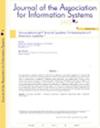Freemium Strategy in Competitive App Markets: Maintaining Profitability with Product Fit Uncertainty
IF 5.5
3区 管理学
Q1 COMPUTER SCIENCE, INFORMATION SYSTEMS
引用次数: 0
Abstract
Today’s app market is highly competitive and rapidly growing. This study considers two app developers with substitutable apps and a continuum of consumers with heterogeneous preferences. Each developer decides between offering a paid app and offering a free basic app with in-app purchases. Because of product fit uncertainty, consumers are not sure about the degree of misfit between the app and their preferences, and that uncertainty can be reduced by trying the free basic app. Using a game-theoretic modeling framework, we analyze how product fit uncertainty affects competing developers’ profits and examine the scenario in which each developer offers a paid app or a free basic app with in-app purchases in a duopoly setting. The analytical results suggest that the developer can offer a free basic app for consumer learning even if the app is not underestimated. When either developer offers a free trial, the developer with the higher-quality app will prefer higher product fit uncertainty, but the one with the lower-quality app will favor lower product fit uncertainty. Additionally, as the app quality increases or consumer preferences become stronger, developers may switch the strategy depending on the reduction in product fit uncertainty caused by the free trial. Our study establishes the usefulness of the freemium strategy beyond the contexts analyzed in the literature. The results explain empirical observations of the app market and provide recommendations about the information disclosure of fit attributes in a competitive market.竞争应用市场中的免费增值策略:在产品不确定的情况下维持盈利
如今的应用市场竞争激烈且发展迅速。本研究考虑了两个具有可替代应用程序的应用程序开发人员和具有不同偏好的连续消费者。每个开发者都要在付费应用和内置付费功能的免费基础应用之间做出选择。由于产品适配的不确定性,消费者无法确定应用与他们偏好之间的不匹配程度,这种不确定性可以通过尝试免费的基础应用来降低。我们使用博弈论建模框架,分析了产品适配的不确定性如何影响竞争开发商的利润,并研究了在双头垄断环境下,每个开发商都提供付费应用或免费基础应用的情况。分析结果表明,开发商可以提供一个免费的基本应用程序,供消费者学习,即使应用程序不被低估。当任何一个开发者提供免费试用时,拥有高质量应用的开发者会更喜欢高产品契合度的不确定性,而拥有低质量应用的开发者会更喜欢低产品契合度的不确定性。此外,随着应用质量的提高或消费者偏好的增强,开发商可能会根据免费试用带来的产品适用性不确定性的减少而改变策略。我们的研究证实了免费增值策略的有用性,超出了文献分析的范围。研究结果解释了应用市场的实证观察结果,并为竞争市场中适合属性的信息披露提供了建议。
本文章由计算机程序翻译,如有差异,请以英文原文为准。
求助全文
约1分钟内获得全文
求助全文
来源期刊

Journal of the Association for Information Systems
工程技术-计算机:信息系统
CiteScore
11.20
自引率
5.20%
发文量
33
审稿时长
>12 weeks
期刊介绍:
The Journal of the Association for Information Systems (JAIS), the flagship journal of the Association for Information Systems, publishes the highest quality scholarship in the field of information systems. It is inclusive in topics, level and unit of analysis, theory, method and philosophical and research approach, reflecting all aspects of Information Systems globally. The Journal promotes innovative, interesting and rigorously developed conceptual and empirical contributions and encourages theory based multi- or inter-disciplinary research.
 求助内容:
求助内容: 应助结果提醒方式:
应助结果提醒方式:


